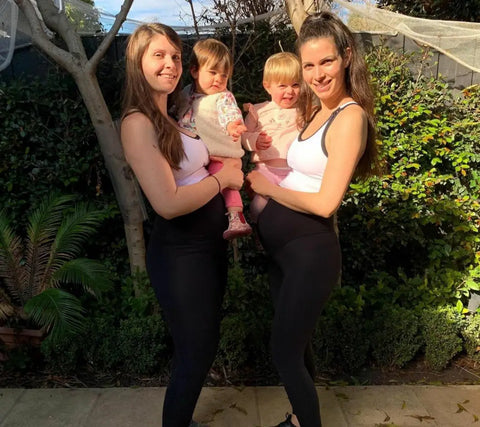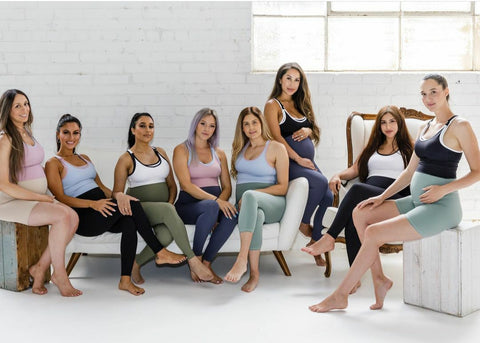As a new mum I honestly hadn't given much thought to how I was going to feed my daughter. I remember being asked maybe once or twice by my obstetrician how I was going to feed my baby and the question was simply "Are you going to breastfeed?" So I naively assumed that breastfeeding was what I was supposed to do.
After all, breast is best, right?
It's how my mother fed me and a quick search online states that only 1 to 5 percent of women can't breastfeed. After my beautiful daughter was born there we were in a hospital room with midwives coming in and out asking if I had fed her yet and I had no idea what I was doing. I had read that breastfeeding was natural and an amazing way to bond with my daughter, that my daughter's instinct would take over and she would know what to do.¹ The first time my daughter latched on it certainly didn't feel natural. And the weeks that followed did not feel natural, I would dread every cry knowing that she wanted to feed. I would cringe every time she latched on.
I couldn't help but ask myself if breastfeeding was natural then why was it so hard?

Australian dietary guidelines recommend exclusive breastfeeding for the first six months and then combined breastfeeding and solid foods until 12 month of age and beyond if the mum and baby desire.² While there is no denying that breastmilk is an amazing source of nutrition for our babies, it is not the only source and for some mums breastfeeding can be a huge struggle and can negatively impact their health and wellbeing. In Australia a reported 96% of new mums start out breastfeeding their babies. At 3 months of age only 39% of babies are exclusively breastfed. At 5 months of age the number of exclusively breastfed babies drops to just 15%.³ Worldwide, only 41% of babies are exclusively breastfed for their first six months.⁴
Breastfeeding is a learned skill. New mums do not possess the skill to breastfeed simply because they gave birth to a beautiful baby. I certainly didn't.
Breastfeeding takes time and practice and there are a number of issues that new mums face that can derail a breastfeeding journey. Sore nipples, bad latch, low milk supply, oversupply of milk, mastitis, low weight gain, work commitments, poor support system, postnatal depression and a nursing strike are just a few of the common breastfeeding problems mums face today.⁵ It's important to also note that no two breastfeeding journeys are the same. Just because a mum has successfully breastfed in the past doesn't guarantee she will again. If a mum has struggled to breastfeed a first baby doesn't mean she won't be able to in the future if she desires. I have breastfed two children and for different reasons have struggled each time.

Recently the Australian Medical Association released new guidelines stating that “mothers and other caregivers who cannot or choose not to breastfeed must have access to appropriate care and assistance to formula-feed their child”.⁶ The stigma surrounding formula feeding is changing and it is becoming more acceptable to say that mum's choice is best. So where can you get support when starting your breastfeeding or formula feeding journey?
Your hospital, GP or Maternal Child and Health service are a great place to start for support and advice. If you are looking to do some research before your baby is born the Raising Children Network and Australian Breastfeeding Association provide a number of online resources to help you make an informed decision on how to feed your baby. Joining a mothers group can be a great way to get support from other mums who are also experiencing having a new baby.
Facebook groups such as Emamaco Mums Tribe can also be a great way to talk and share with other mums from the comfort of your home - and for mums of reflux babies such as myself this is a godsend!

Raising a baby is hard. And it is made harder by the pressure placed on mums to breastfeed because they think they should. Feed your baby however you want, whether it's breastmilk or formula. Whether you can, cant or choose not to breastfeed it is important to be mindful of your own health and wellbeing and choose what's right for your family. Sometimes breast isn't always best.
- Breastfeeding FAQs. (2019). Australian Breastfeeding Association. URL: https://www.breastfeeding.asn.au/bf-info/your-baby-arrives/breastfeeding-faqs Accessed 8/8/21
- National Health and Medical Research Council 2012, Infant Feeding Guidelines, Canberra: National Health and Medical Research Council URL: www.eatforhealth.gov.au Accessed 9/8/21
- Australian Institute of Health and Welfare 2011, 2010 Australian National Infant Feeding Survey: Indicator Results. Canberra: AIHW. URL: http://www.aihw.gov.au/publication-detail/?id=10737420927 Accessed 9/8/21
- Gupta, A., Suri, S., Dadhich, J.P. et al. The World Breastfeeding Trends Initiative: Implementation of the Global Strategy for Infant and Young Child Feeding in 84 countries. J Public Health Pol 40, 35–65 (2019). URL: https://doi.org/10.1057/s41271-018-0153-9 Acccessed 8/8/21
- Amir LH, Bearzatto A. Overcoming challenges faced by breastfeeding mothers. Aust Fam Physician. 2016 Aug;45(8):552-6. PMID: 27610443. Accessed 7/8/21
- Australian Medical Association 2017, Infant Feeding and Parental Health - 2017. URL: https://www.ama.com.au/position-statement/infant-feeding-and-parental-health-2017 Accessed 9/8/21

